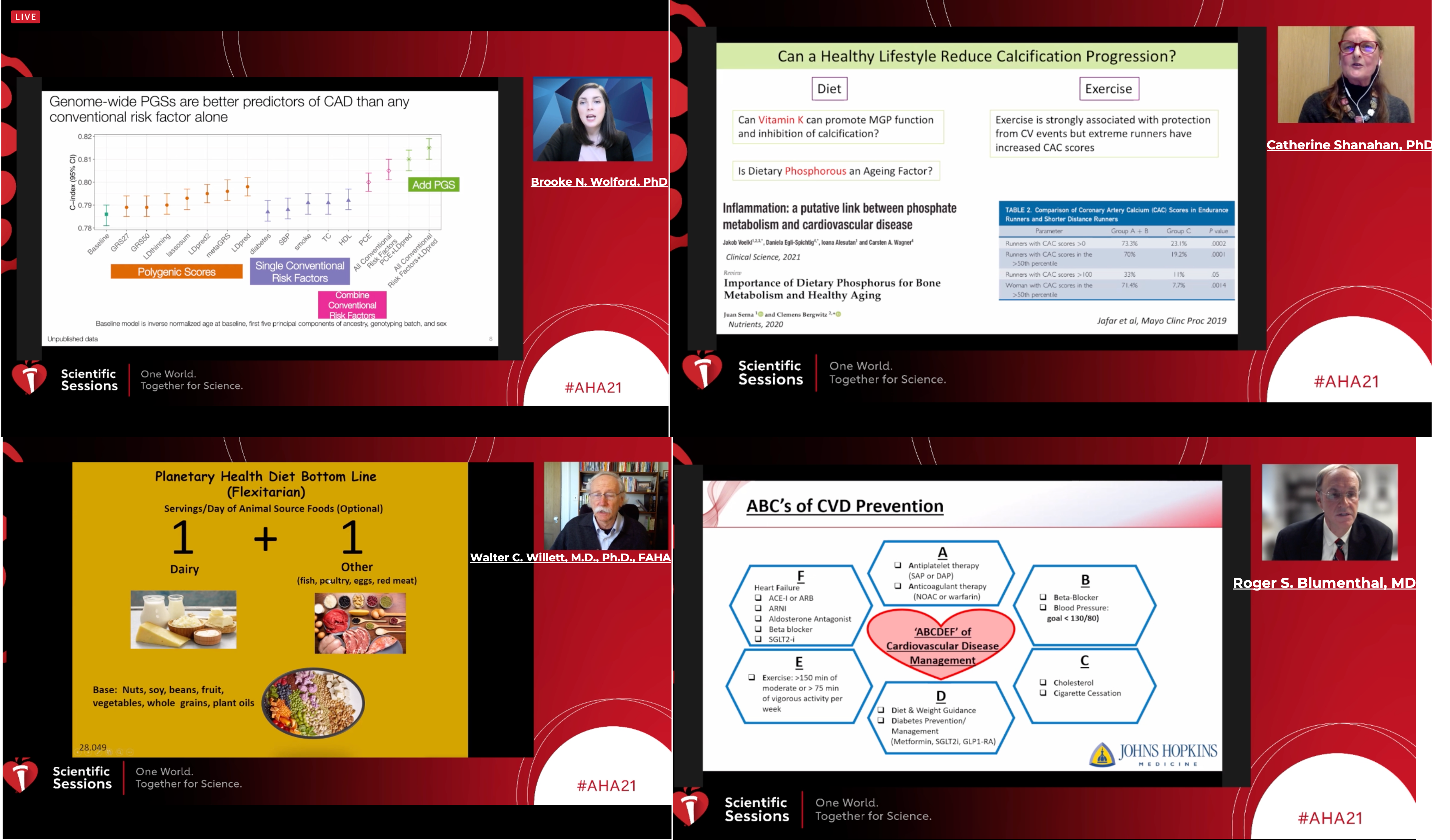
One of the hot topics from this year’s AHA21 Scientific Sessions main event was how to promote healthy vascular aging. Age is the strongest predictor for cardiovascular (CV) risk and risk factors such as genetic predisposition and hyperlipidemia increase CV risk. The general recommendations to reduce CV risk were elegantly presented by Dr Roger S. Blumenthal, MD from Johns Hopkins Ciccarone Center during the “Novel Strategies to Promote Healthy Vascular Aging” AHA21 session. These recommendations mainly focused on promoting a healthy lifestyle via an ABCDE toolbox.
It is important to first Assess someone’s CV risk which can be done using the coronary artery calcium score for example. A novel approach to improve current methods of CV risk assessment above and beyond the current methods is via the implementation of a polygenic risk scores (PGS) which was discussed by Dr Brooke N. Wolford, PhD from the University of Michigan. PGS rely on GWAS data to estimate an individual’s predisposition to a disease and have shown to reclassify about 10% of individuals that were initially misclassified from a ‘low risk’ or ‘intermediate risk’ category into the ‘high risk’ category. The limitation of using PGS however is that it requires genetic testing which might not be currently accessible to all patients. However, the advances in genetic screening technologies might render this possible in the near future.
Blood pressure control is crucial to prevent cardiovascular disease since hypertension increases the risk of stroke, heart attack and heart failure. Controlling blood pressure can be achieved by following a healthy Diet. In light of the growing awareness about climate change, people have been wondering how they can have a diet that is both healthy and sustainable. This contemporary topic was presented by Walter C. Willett, M.D., Ph.D., FAHA from Harvard T.H. Chan School of Public Health and introduced the concept of planetary health diet. This ‘flexitarian’ diet favors plant-based food while allowing one dairy serving a day and other animal products (such as fish, poultry, eggs and meat) to a maximum of two servings a week. Red meat consumption, which is known to have deleterious effects on planet sustainability, increases LDL-Cholesterol levels in comparison to high quality plant protein diet (legumes, soy, nuts). This means that replacing red meat proteins with plant based proteins can be healthy for us and for the planet.
Exercise in known to reduce all-cause mortality and cardiovascular disease in all ages and even a small amount of aerobic exercise is enough to reduce CV risk. Dr Anthony J. Donato, PhD, MS from the University of Utah presented the benefits of exercise on endothelial dilatation which is a parameter that usually decreases with age and is associated with CV risk. Endothelial cells lose their ability to secrete nitric oxide with time which reduces their vasodilatory properties. Exercise is known to promote a healthier endothelium by increasing endothelial dilatation and reducing endothelial oxidative stress.
A topic that has gained a lot of attention recently in the field of cardiovascular disease and ageing is senescence. Senescence, or biological aging, is induced by DNA damage and leads to metabolically active cells that do not replicate. Vascular senescence increases inflammation and oxidative stress within the vasculature which leads to endothelial dysfunction and smooth muscle cell trans-differentiation. This exciting topic was covered by Dr Catherine Shanahan, PhD from King’s College London where she showed that senescence can accelerate smooth muscle cells ectopic calcification leading to early aging vessels. Senescence is emerging as a key player in chronic diseases and an attractive mechanism that can be targeted to increase longevity.
References:
- Choi SW, Mak TS-H, O’Reilly PF. Tutorial: a guide to performing polygenic risk score analyses. Nat Protoc. 2020 Sep;15(9):2759–72.
- Willett W, Rockström J, Loken B, Springmann M, Lang T, Vermeulen S, et al. Food in the Anthropocene: the EAT–Lancet Commission on healthy diets from sustainable food systems. The Lancet. 2019 Feb 2;393(10170):447–92.
- Guasch-Ferré M, Satija A, Blondin SA, Janiszewski M, Emlen E, O’Connor LE, et al. Meta-Analysis of Randomized Controlled Trials of Red Meat Consumption in Comparison With Various Comparison Diets on Cardiovascular Risk Factors. Circulation. 2019 Apr 9;139(15):1828–45.
- Donato AJ, Morgan RG, Walker AE, Lesniewski LA. Cellular and molecular biology of aging endothelial cells. J Mol Cell Cardiol. 2015 Dec;89(Pt B):122–35.
- Pierce GL, Donato AJ, LaRocca TJ, Eskurza I, Silver AE, Seals DR. Habitually exercising older men do not demonstrate age-associated vascular endothelial oxidative stress. Aging Cell. 2011 Dec;10(6):1032–7.
- Sanchis P, Ho CY, Liu Y, Beltran LE, Ahmad S, Jacob AP, et al. Arterial “inflammaging” drives vascular calcification in children on dialysis. Kidney Int. 2019 Apr 1;95(4):958–72.
“The views, opinions and positions expressed within this blog are those of the author(s) alone and do not represent those of the American Heart Association. The accuracy, completeness and validity of any statements made within this article are not guaranteed. We accept no liability for any errors, omissions or representations. The copyright of this content belongs to the author and any liability with regards to infringement of intellectual property rights remains with them. The Early Career Voice blog is not intended to provide medical advice or treatment. Only your healthcare provider can provide that. The American Heart Association recommends that you consult your healthcare provider regarding your personal health matters. If you think you are having a heart attack, stroke or another emergency, please call 911 immediately.”